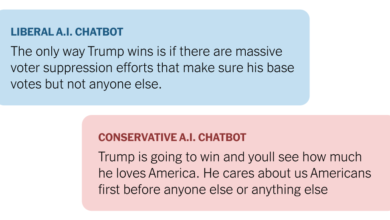Meta to use Instagram and Facebook posts from as far back as 2007 to train artificial intelligence tools

If you’re among the majority of Australians with Facebook or Instagram accounts, your social activity on those platforms is about to start training Meta’s artificial intelligence (AI) tools – and if you live in Australia, you can’t say no.
It’s a major concern for users and experts alike. It’s particularly troubling for artists, who worry this will affect their livelihood.
The policy update
Starting June 26, there’s a new privacy policy coming from Meta, the parent company of Facebook and Instagram.
When that policy comes into effect, Meta will start taking user data from as far back as 2007 and use it to train and improve their AI tools. That includes your posts, photos, captions, and messages to Meta’s AI chatbot. They will not be using private messages.
If you don’t like the sounds of that, unfortunately your hands are tied.
As of now, only users in the European Union and the US state of Illinois can opt out, because they have AI protection laws like the General Data Protection Regulation (GDPR) in place.
So, how do Australians feel about that?
When asked on the street, most Australians responded with “I did not know that” – and they weren’t happy. There were plenty of replies like “That’s kind of concerning”, as well as “Feels a bit like an invasion of privacy” and “Oh, that’s not good. That feels bad. I don’t like that”. There were also handfuls of “I’m not that surprised”.
Users give Meta permission to use their data this way when they agree to the terms of service on the platforms.
But when asked, most Australians admit they’ve never read them.
‘I have a skill that I’ve worked on, and it’s mine’
Children’s Illustrator Sara Fandrey lives in Portugal. When she found out this update was coming, she was furious.
“We were like, we need to tell as many people as we can,” she said.
She posted a video to Instagram, showing how to fill out an objection form – which she could access, as Portugal is in the EU.
That video now has over 7 million views.
“I had absolutely no idea it would become this viral, and would start a series of things, [like] people closing down their accounts.”
Videos like Sara’s began cropping up on all kinds of social media platforms, and the hashtag #noaiart was born.
Searches for “Instagram ai opt-out” on Google increased, and with it, articles explaining how to opt out.
“I was completely shocked,” Sara said.
“How can a multimillionaire company like Meta take what’s mine, what’s my intellectual property, and just scrape it off and feed it to their AI?”
Meta’s AI Creative Tools can already generate images for you.
And that’s another sore spot for artists like Sara.
“These images do not come from thin air. They’re all based on other images. I matter. I am a human being. I have a voice. I have a skill that I have gained that I’ve worked on and it’s mine.”
As an artist, she is concerned that her livelihood is going to be impacted by this. She’s not alone in that opinion.
Thomas Fitzpatrick is a Sydney-based Illustrator.
Since he can’t opt out, he is considering other options.
“I’ll probably stop using Instagram. I have no interest in having my work trained in algorithms and models, so I’ll honestly probably just get rid of it.”
He’s concerned for the future of the industry.
“For illustrators and creatives who are starting out, it’s going to take a lot of work away from them,” he said.
“If you’re a small business, it’s very cheap to just type something in and get results straight away. So why would you pay an up-and-coming illustrator?”
Loading…
How is Meta allowed to do this anyway?
Dr Joanne Gray, a lecturer in digital cultures at the University of Sydney, explains: “The precedent in the US suggests that these companies are doing it under fair use, a US exemption that allows you to do some copying and create something new.
“These models copy style. While it’s not copyright infringement to copy style, it is important as an economic asset to people when they become established.
“And so, it’s a threat to their business in a new way, outside of copyright.”
This is all so new and unprecedented, she explains, that “we’re really yet to see how that’s going to play out in terms of legal cases, but also in terms of how creators might be remunerated.”
Speaking of legal cases, advocacy group NOYB (none of your business) has launched 11 complaints against Meta in the EU in relation to this new policy.
Dr Gray adds: “We need to do more to ensure that we have better control over our data and that these corporations don’t have unfettered access to make money and trade on data that’s created by us and about us.”
Is this the new normal?
Meta seemingly doesn’t plan to get rid of AI anytime soon.
They’ve now added a “Made by AI” label, requiring users to have all realistic appearing AI-generated content carry it.
Artists have taken note and are migrating to apps like Cara – an artist-run, anti-AI social platform.
Its user base has grown from 40,000 to over 650,000 in a week due to Meta’s new privacy policy.
Cara incorporates a project called Glaze, “a system designed to protect human artists by disrupting style mimicry in the training of generative AI models”.
As major players like Meta make moves in the AI space, users will continue to react accordingly.
A spokesperson from Meta says they are committed to building AI responsibly.
They went on to say Meta has shared details online about what information will be used, which it says is consistent with its privacy policy and terms of service.
This story aired on ABC Radio’s PM on Thursday. You can listen here.
Posted , updated



